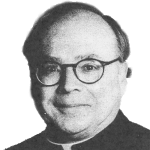A Jesuit named John Courtney Murray once warned us in a prophetic book that the freedoms we Americans enjoy are constantly threatened by what he calls “barbarism,” which results from the very nature of humanity. We are at once capable of knowing and doing what is true and good and prone to greed, blind prejudice, unregulated passion and thewillful self-centeredness of solipsism. These corrode and confound our highest aspirations and noblest intentions.
When they eat away at the freedom of individuals to order their minds and hearts rightly, they can’t help but also eat away at the common good of the body politic. It’s a sad commentary on the current state of the American university to say that it’s contributing to barbarism. Let me explain why and suggest what we can do.
When we survey the modern university, we see a range of mixed views about its ultimate end, goal and purpose.
There’s the view of Warden Roberts of Merton College Oxford. He claims that liberal education has entered into complicity with the rampant materialism of market economics. The university’s value has devolved into its mercantile ability to manipulate nature, create wealth and augment the power of corporate elites. When the university thus incubates greed, the plutocratic ambitions of lobbyists and cartels more readily undermine the harmony of local communities.
Then there’s the view of former Stanford University President Donald Kennedy. He argues that the current leadership of American universities has failed to create individualized identities for its schools. The result is an increasing trend for universities to become a generic “vanilla” that blandly homogenizes subjects of research and methods of inquiry. The ensuing lack of diversity renders the educational enterprise prone to the prejudice of “groupthink.” This, of course, is the very seedbed of fascism.
There’s also the postmodern view. At best, it seeks to redress the exclusion of minority viewpoints in the West’s dominant forms of thought. But at worst, says Professor Jon Ellis of the University of California, Santa Cruz, it deconstructs these forms without replacing them. Jean-François Lyotard, a prominent postmodernist, holds that our modern plight is all about a “fission of meaning.” This means (ironically) that reason lacks any laws governing it. Without these, we become the hostages of brute passion. When this happens, thecivil order more easily surrenders to the demagoguery of partisan politics and media glibness. These count among the “worst,” as the poet William Butler Yeats opines, because they “lack all conviction.”
Last, there is the secularism that lingers from the Enlightenment. The opposite of postmodernism, it’s actually the foundation of the contemporary university. It distrusts giving religion and theology a place among the academic disciplines. According to the great German thinker Emmanuel Kant, theology bases itself on faith, which accepts traditions blindly and uncritically. It is the role of philosophy — human reason free of such constraints — to purge faith of its superstitious tendencies. The problem with this view is that it devolves into its own superstition. It mistakenly assumes reason to deliver results beyond its ken and so makes reason into a fetish. When it is over-aggrandized in the university, reason renders us hostages of an arrogant solipsism. This, in turn, feeds chauvinism and imperialism.
Greed, prejudice, passion and solipsism: these plant the barbarism that blossoms into a disordered commonwealth, whether plutocratic, fascist, demagogic or imperialist. It is then the patriotic duty of every conscientious person who enjoys America’s freedoms to resist it.
But what of us who live and study on the Hilltop? That barbarism skulks among us should not be surprising. If we’re honest, we feel it deep within ourselves as those persistent urges that demand attention most Thursday evenings through Sunday noontimes. But it dwells, too, in our classrooms, lecture halls and labs. A university, after all, teaches universal knowledge; it is a bazaar, a vast marketplace, teeming with ideas on show. But no one should be fooled into believing that every idea hawked there is equally true. American education is “liberal” in its panoply of offerings, but some, even many, of its wares will enslave, not “liberate.”
Our job is to be discriminating buyers of quality in the Hilltop’s mall of thought. We cannot permit the glittering allure of poor ideas that masquerade as truth in a university to deceive us. Recall the legacy our Founding Fathers bequeathed to us. Some truths are self-evident. They are accessible to right-thinking minds; they rise above mere opinion, personal preference, subjective taste and individual whim. Only the vigorous pursuit of truth — empirical, ethical and religious — will empower our minds to bridle the innate greed and passion lurking in ourselves and our places of study.
The best way to find truth is to befriend great ideas. Find these, and the professors who love them, and they will set us free to keep America free.
 Fr. Stephen Fields, S.J., is an associate professor in the Department of Theology. He is a guest author for As This Jesuit Sees It … which appears every other Friday.
Fr. Stephen Fields, S.J., is an associate professor in the Department of Theology. He is a guest author for As This Jesuit Sees It … which appears every other Friday.




















AMDG • Oct 17, 2014 at 2:39 pm
Excellent column Father. It’s nice to see the light of truth grace this publication once in a while.